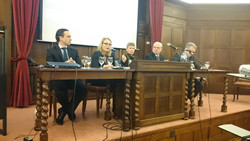VERA final conference offers forward visions on future ERA
The EU has been striving to create a European Research Area (ERA) for many years now. Although there are outstanding issues that still block ERA’s completion, according to the 2014 ERA progress report(opens in new window) we are indeed moving in the right direction. In the coming years, the ERA will continue to evolve in response to the changing contexts. The VERA project (‘Forward Visions on the European Research Area’) – which held its final conference in Brussels last week – has been working for the past three years in a team with ten partnering institutions to provide research that will better equip ERA for dealing with the challenges of the future. A large part of the VERA team’s work has been to develop four future scenarios(opens in new window) for how European society and the ERA might develop – four different ‘stories of the world’ in 2030. Speaking at the conference, project coordinator Stephanie Daimer from the Fraunhofer Institute for Systems and Innovation Research ISI introduced the four possible realities, each offering a different context and societal response influenced by external and internal factors such as the EU recovering from the crisis or not or runaway climate change occurring. The scenarios were developed jointly by the VERA team and stakeholders based on an in-depth stocktaking of research, technology, development and innovation (RTDI)-related activities and a review of trends and drivers of long-term change of European RTDI governance. The thrust of each scenario is summed up in its name: Private Knowledge – global markets; Societal challenges – joint action; Solutions apart – local is beautiful; and Times of crises – experts at the wheel. Stephanie explained how the VERA team used these scenarios in two main ways: firstly, researchers used the scenarios as a tool to engage in a strategic debate with stakeholders and secondly, the VERA team applied ‘policy lenses’ to the scenarios to help structure future choices for ERA. Based on this research, all issues which the VERA team deem relevant for consideration by policy-makers are being framed into policy briefs. One such policy brief, ‘Evolving Dimensions of the European Research and Innovation Landscape’, was presented by VERA team member Rafael Popper from the University of Manchester at the final conference. The brief presents ‘issues which need policy consideration’ rather than ‘policy recommendations’ so that the discussions on ERA can remain an open one. Stephanie noted, ‘As we think that the overarching objectives of the European Research Area are yet to be defined, the VERA project sees its role in presenting systematically the alternative possible developments by using scenarios, as well as in analysing the policy implications following from those scenarios and presenting them as a structured set of choices and their associated consequences’. There will be at least one more policy brief which will include considerations for a long-term perspective based on extensive analysis of the developed scenarios for the ERA in 2030. This is important because the policy choices of today can affect the availability of alternatives in the future, as Stephanie explained: ‘In order to avoid unintended trajectories of today’s choices, we need to be aware of their consequences. For example, “framework conditions” such as IPR, standards or public procurement, will be very different depending on the political context within which they operate, and which in turn they help shape. Although these issues are often seen as a pure technical matter, the VERA scenarios have alerted us to the profoundly political nature of regulatory debates’. Speaking at the final conference, Fabienne Gautier, who works on ERA policy at the European Commission’s DG for Research and Innovation, noted how the work of VERA could provide a tool for evidence-based policy making, offering guidance for future policy directions in different contexts dominated by different societal challenges. Indeed, the project team is currently in discussion with the European Commission and the ERA stakeholder platform on how to generate impact from the VERA outcomes and it has already been invited to present VERA to the European Research Area and Innovation Committee (ERAC). The VERA team is convinced that the project will leave an important mark on the ERA discussion, as Stephanie noted, ‘By contributing to the intensification and broadening of stakeholder networks as well as by systematically exploring the future using scenario analysis, VERA has marked an important step on the way to an ERA Vision, as such collective vision building processes need to build on these two preconditions’. For further information, please visit: VERA http://www.eravisions.eu/(opens in new window)
Countries
Germany



